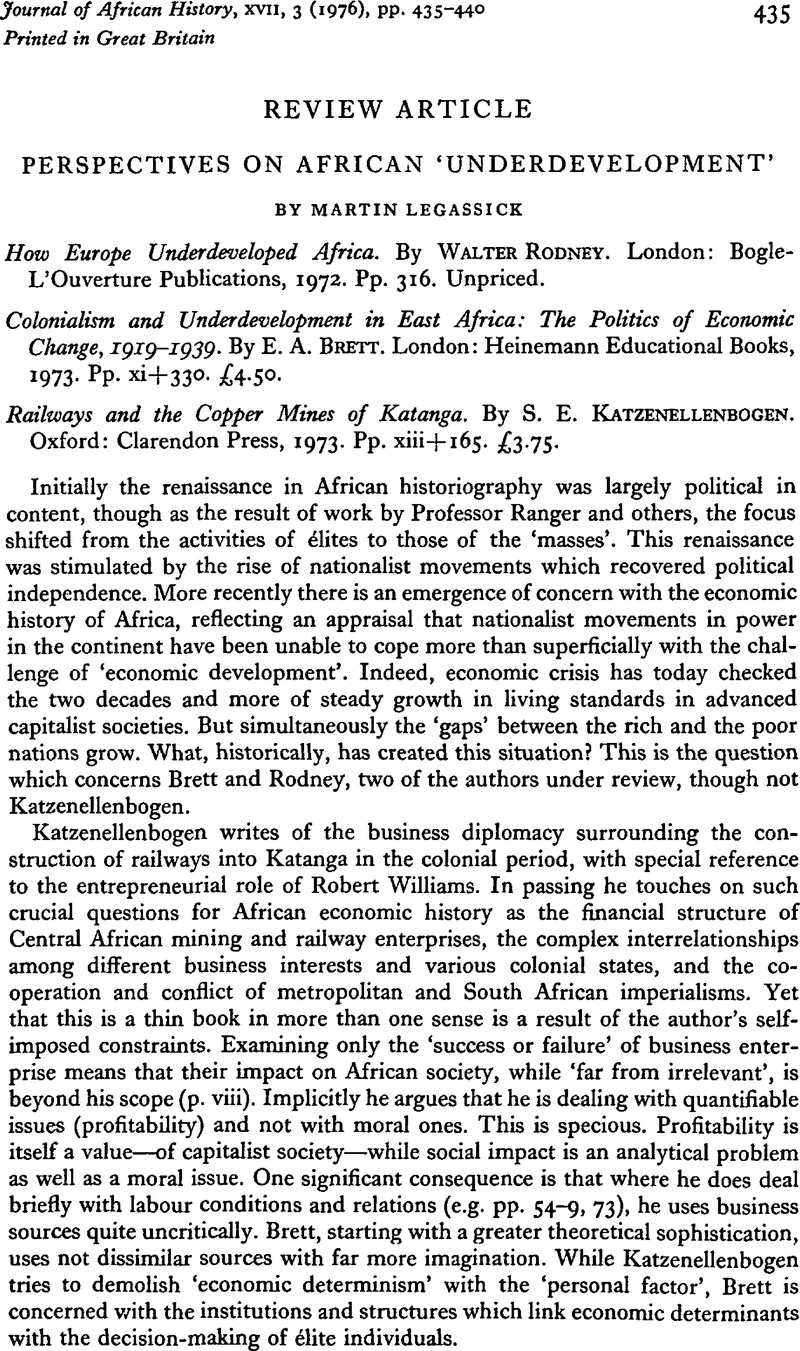Published online by Cambridge University Press: 22 January 2009

1 Frank, A. G., Capitalism and Underdevelopment in Latin America (New York, 1967)Google Scholar and later volumes. For an assessment of the context and character of Frank's work see Oxaal, I. et al. (eds.). Beyond the Sociology of Development (London, 1975).Google Scholar
2 Ranger, T. (ed.) Emerging Themes of African History (London, 1968), p. xxi.Google Scholar
3 For example Lamb, G., Peasant Politics (London, 1974)Google Scholar; Leys, C., Underdevelopment in Kenya (London, 1975)Google Scholar; Shivji, Issa, Class Struggles in Tanzania (London, 1976)Google Scholar; and forthcoming work by Mahmoud Mamdani.
4 There is useful discussion of this issue in Kay, G., Development and Underdevelopment (London, 1975), chaps. 2 and 5.Google Scholar
5 A related examination, which Rodney does not undertake, is of the role of Indian merchant capital in East Africa: cf. Alpers, E., Ivory and Slaves in East Central Africa (London, 1975)Google Scholar. Similarly, in the colonial period, Indian capital cannot be ignored: see Mamdani, M.'s review of Brett in the African Review, Jan. 1975.Google Scholar
6 See for example Terray, F., ‘Long-distance exchange and the formation of the State: the case of the Abron kingdom of Gyaman’, Economy and Society, in, 3 August 1974Google Scholar. Terray's characterization of production in this social formation is interestingly comparable with others in Africa including the prazo system: see Isaacman, A., Mozambique (Madison, 1972).Google Scholar
7 On this, see inter alia, the recent debate among Warren, Emmanuel, McMichael, Petras and Rhodes in New Left Review, Nos 81, 85. Also Kay, op. chap. 6.
8 See for example Emmanuel, A., Unequal Exchange (London, 1972)Google Scholar; Amin, S., Accumolation on a World Scale (New York, 1973)Google Scholar, and later books by Palloix and Amin in French. See also Baran, P., The Political Economy of Growth (New York, 1957)Google Scholar; Kemp, T., Theories of Imperialism (London, 1967)Google Scholar; chapters by Hodgkin, and Sutcliffe, in Owen, R. and Sutcliffe, B. (eds.), Studies in the Theory of Imperialism (London, 1972).Google Scholar
9 Mamdani, op. cit.
10 This is partly a problem of the use of sources: for the officials administering the colonies, this was how the situation ‘appeared’. Rodney wrote a useful article on the Scramble in Monthly Review, March 1970.
11 Kay, op. cit., and Wallerstein, I. ‘The Three Stages of African Involvement in the World Economy’, in Gutkind, P. and Wallerstein, I. (eds.) The Political Economy of Contemporary Africa (forthcoming).Google Scholar